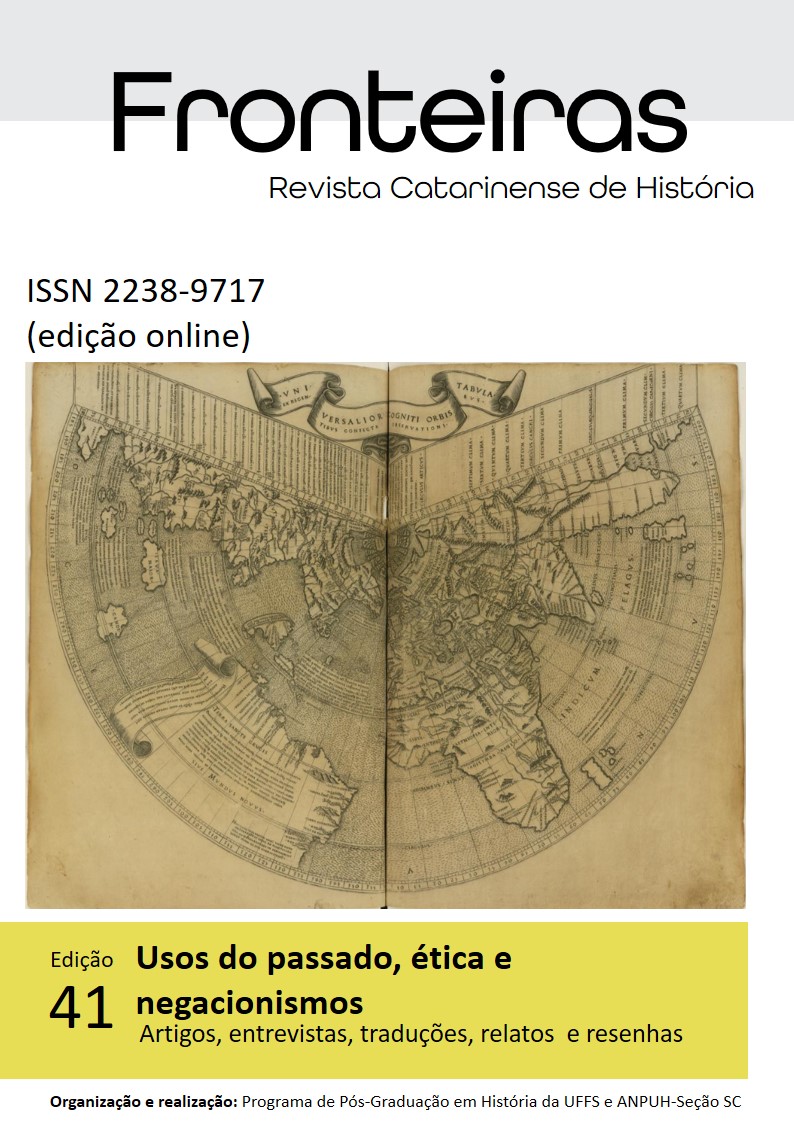Independence, updatism and denialism
How to send histories to the future
DOI:
https://doi.org/10.36661/2238-9717.2023n41.13303Keywords:
Updatism, Independence, Bolsonarism, Anpuh-BrasilAbstract
This text addresses historical culture and historicity in the circumstances of 1822 and 2022. The commemorations of the Bicentennial of the Independence of Brazil made the permanence of some historical structures more visible. The argument is divided into four parts. In the first, it presents the contours of what is called Euro-Christian identity, a product of the complex process that led to Independence, particularly in its historiographical structures, considered here as fact and indicator of that process. The second part demonstrates how the ruins of these identity narratives continue to feed the bolsonarist imagination. The third advances in the description of the historicity of bolsonarist populism anchored in the theory of Updatism. Finally, it describes some actions promoted by Anpuh-Brasil to face this situation marked by an acute crisis of communicative mediation.
Downloads
References
ABRANCHES, Sérgio. O tempo dos governos incidentais. São Paulo: Companhia das Letras, 2020.
ANDERSON, Perry. Bolsonaro’s Brazil. London Review of Books, 2019. Disponível em https://www.lrb.co.uk/the-paper/v41/n03/perry-anderson/bolsonaro-s-brazil. Acesso em 15 mar 2022.
ARAUJO, Valdei L. et al. Bolsotrump: realidades paralelas (2020-2022). Rio de Janeiro: Editora FGV, 2022.
ARAUJO, V. L.; PEREIRA, M. H. F. Atualismo 1.0: como a ideia de atualização mudou o século XXI. Vitória: Milfontes, 2019.
BRIGGLE, Adam. Dear Facebook?. In: WITTKOWER, D.E. (Org.). Facebook and Philosophy. Chicago: Open Court, 2010, p. 161-172.
BURITY, Joanildo. The Brazilian Conservative Wave, the Bolsonaro Administration and Religious Actors. Brazilian Political Science Review, v. 15, n. 3, e0005, 2021.
CHAGAS, Viktor. Meu malvado favorito: os memes bolsonaristas de WhatsApp e os acontecimentos políticos no Brasil. Estudos Históricos, v. 34, n. 72, p. 169-196, 2021.
CHEYFITZ, Eric. The Disinformation Age. Nova York: Routledge, 2017.
CLAVERT, Frédéric. Face au passé: la Grande Guerre sur Twitter. Le Temps des médias, v. 31, n. 2, p. 173-186, 2018.
FINCHELSTEIN, Federico. From Fascism to Populism in History. Berkeley: UCPRESS, 2019.
GAGO, Verónica. Neoliberalism from Below. Durham: Duke Universiy Press, 2017.
GOMES, Angela. M. de Castro. The History and Historiography of Populism in Brazil (1930 - 1964). Oxford Research Encyclopedia of Latin American History. Oxford: Oxford University Press, 2021, p. 1-17.
GOMES, Angela. M. C.; DEVOTO, Fernando. J. Le gouvernement Bolsonaro: ni fascisme ni populisme, autoritarisme radical. Politika, 2020. Disponível em: https://www.politika.io/fr/article/gouvernement-bolsonaro-fascisme-populisme-autoritarisme-radical. Acesso em 15 mar 2022.
ISAAC, Mike. Super Pumped: The Battle for UBER. Nova York: W. W. Norton & Company, 2019.
KLEN, Bruna. et al (ed.) Do fake ao fato: (des)atualizando Bolsonaro. Vitória: Milfontes, 2020.
LEE, Newton. Facebook Nation: Total Information Awareness. New York: Springler, 2014.
MOFFIT, Benjamin. Populism versus technocracy in: COSSARINI, Paolo et al. (eds.), Populism and Passions. Londres: Routledge, 2019, p. 49-64.
MORGAN, R.; CLULOW, J. The Proles and Cons of Facebook. In: WITTKOWER, D.E. Facebook and Philosophy. Chicago: Open Court, 2010, p. 258-9.
OLIVEIRA, Rodrigo Perez; PINHA, Daniel. (org.). Tempos de Crise: ensaios de história política. Rio de Janeiro: Autografia, 2020.
PAULA, Carolina et al. Bolsonarismo no Brasil. 2021. Disponível em: https://iree.org.br/wp-content/uploads/2021/08/Pesquisa-Bolsonarismo-no-Brasil.pdf. Acesso em 15 mar 2022.
PEREIRA, Mateus. H. F. Lembrança do presente: Ensaios sobre a condição histórica na era da internet. Belo Horizonte: Autêntica Editora, 2022.
PEREIRA, Mateus; ARAUJO, Valdei. Vozes sobre Bolsonaro, In: KLEN, Bruna et al (ed.) Do fake ao fato: (des)atualizando Bolsonaro. Vitória: Milfontes, 2020, p. 115-140.
PEREIRA, Mateus; MARQUES, Mayra; ARAUJO, Valdei. Almanaque da Covid-19: 150 dias para não esquecer ou a história do encontro entre um presidente fake e um vírus real. Vitória: Milfontes, 2020.
PIMENTA, João Paulo G. et al. A Independência e uma cultura de história no Brasil, Almanack, n. 8, p. 5–36, 2014.
RAMALHO, Walderez. Reinterpreting the times of crisis based on the asymmetry between chronos and kairos. História da Historiografia, v. 14, n. 35, p. 115-144, 2021.
ROCHA, Camila; SOLANO, Ester; MEDEIROS, Jonas. The Bolsonaro Paradox. Londres: Springer, 2021.
ROCHA, João César C. Guerra Cultural e Retórica do Ódio. São Paulo: Caminhos Editora e Livraria, 2021.
TAMAKI, Eduardo Ryo; FUKS, Mario. Populism in Brazil’s 2018 general elections, Lua Nova, n. 109, 2020, p. 103-127.
VALENCIA-GARCÍA, Louie Dean (Org.) Far-Right Revisionism and the End of History: Alt/Histories. Nova York: Routledge, 2020.
ZUBOFF, Shoshana. The Age of Surveillance Capitalism. Nova York: Hachette Book, 2019.
ZÚÑIGA, Homero Gil. Populism in the era of Twitter. New Media & Society, v. 22, n. 4, p. 585-594, 2020.



















